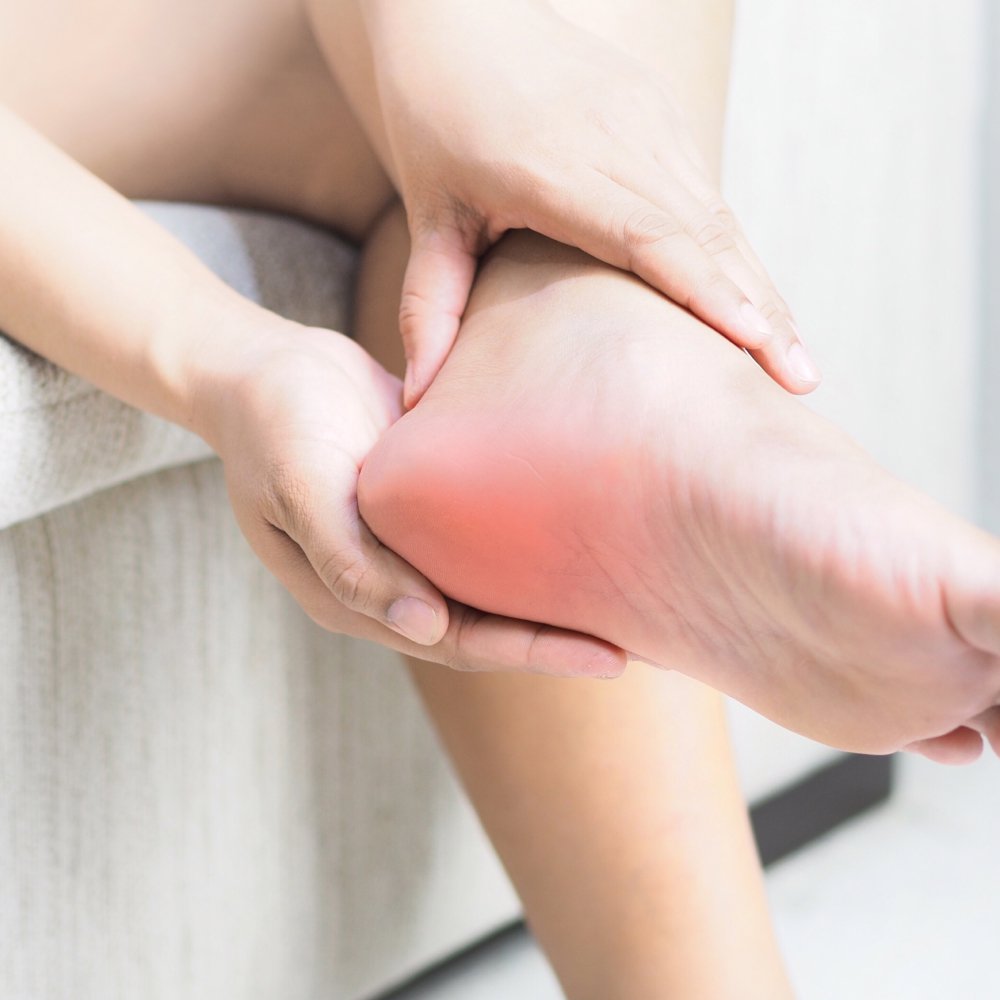Expert Heel Pain Treatment in Vadodara
End morning heel pain and walking discomfort. Get lasting relief from plantar fasciitis and heel spurs through specialized chiropractic care.

Understanding Heel Pain
Heel pain is one of the most common foot problems, often caused by inflammation of the plantar fascia ligament
What Causes Heel Pain?
Heel pain typically develops when excessive stress is placed on the plantar fascia - the thick band of tissue that connects your heel bone to your toes. This stress causes inflammation, micro-tears, and pain in the heel and arch area.
- Plantar Fasciitis - Inflammation of the plantar fascia ligament, the most common cause of heel pain
- Heel Spurs - Bony growths that develop on the heel bone due to chronic plantar fascia tension
- Overuse & Strain - Sudden increase in physical activity, prolonged standing, or improper footwear
- Biomechanical Issues - Flat feet, high arches, or abnormal walking patterns that stress the heel
- Achilles Tendinitis - Inflammation of the Achilles tendon where it attaches to the heel bone
Most heel pain responds well to conservative chiropractic care that addresses both the symptoms and underlying causes.

Recognizing Heel Pain Symptoms
Heel pain symptoms can vary from mild discomfort to severe, debilitating pain
Morning Heel Pain
Sharp, stabbing pain in the heel during the first steps after waking up or after long periods of rest.
Pain After Activity
Dull ache or burning sensation that develops after prolonged standing, walking, or physical activity.
Arch Discomfort
Tenderness and pain along the arch of the foot, often accompanying heel pain in plantar fasciitis.
Swelling & Inflammation
Mild swelling, redness, or warmth in the heel area, especially after aggravating activities.
Our Heel Pain Treatment Approach
Comprehensive care to relieve inflammation and address biomechanical causes
Diagnostic Assessment

Foot Biomechanics Assessment
Detailed evaluation of foot structure, arch type, gait pattern, and weight distribution to identify contributing factors.

Palpation & Tenderness Mapping
Specific pressure testing to locate exact pain points, identify trigger points, and assess tissue integrity.

Gait Analysis
Observation of walking and running patterns to identify abnormal mechanics that contribute to heel stress.
Our Treatment Methods

Plantar Fascia Release
Targeted soft tissue therapy to release tension in the plantar fascia, reduce inflammation, and promote healing.

IASTM Therapy
Instrument-assisted techniques to break down scar tissue, improve mobility, and stimulate healing response.

Therapeutic Stretching
Specific stretches for calf muscles, Achilles tendon, and plantar fascia to improve flexibility and reduce tension.

Dry Needling
Precise needling technique to release trigger points in calf muscles and plantar fascia for immediate pain relief.

Biomechanical Correction
Custom orthotics, footwear recommendations, and gait retraining to address underlying structural issues.

Foot Rehabilitation
Strengthening exercises for foot intrinsic muscles and lower leg to improve stability and prevent recurrence.
Patient Success Story
Real results from our heel pain treatment
"I suffered from severe heel pain for over a year that made every morning miserable. The first steps out of bed were excruciating. After just 4 weeks of treatment at Spine-X, my morning pain was completely gone. The combination of soft tissue work, stretching exercises, and proper footwear advice has given me my active lifestyle back. I can now walk and exercise without constantly worrying about my heels."
- Patient from Vadodara (Heel Pain Treatment Success)
Preventing Heel Pain Recurrence
Lifestyle modifications and proper foot care to protect your heels long-term
Proper Footwear
Wear supportive shoes with good arch support and cushioning. Avoid flat shoes and high heels for extended periods.
Gradual Activity Increase
Slowly increase exercise intensity and duration. Avoid sudden changes in activity level that stress the plantar fascia.
Weight Management
Maintain healthy weight to reduce pressure on heels. Every extra pound adds significant stress to plantar fascia.
Night Splints
Use night splints to keep plantar fascia stretched during sleep, preventing morning pain and stiffness.
Ice Therapy
Apply ice to heels after activity to reduce inflammation. Roll frozen water bottle under foot for combined ice and massage.
Regular Stretching
Perform calf and plantar fascia stretches daily, especially before getting out of bed and after prolonged sitting.
Ready to Walk Without Heel Pain?
Start your journey to pain-free movement with our specialized heel pain treatment
95% Success Rate in 4-8 Weeks
Most heel pain patients experience significant improvement and return to normal activities through our comprehensive approach